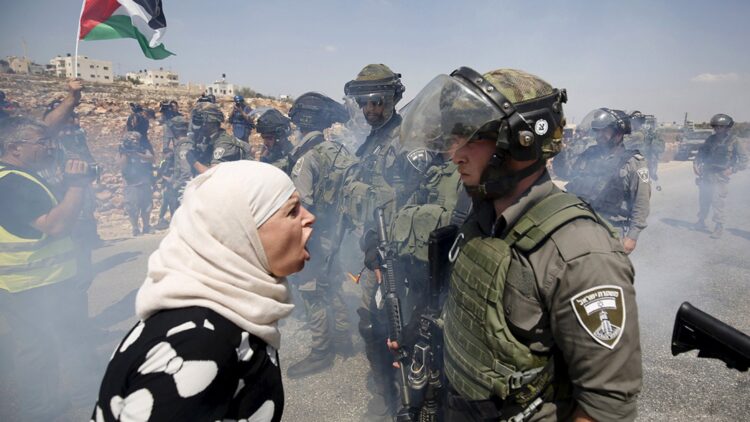By Mark Langley And Tony O’Reilly-
The Israel-Palestine conflict is one of the most enduring and deeply rooted conflicts in modern history.
It has brought untold suffering to generations of people in the region, resulted in multiple wars and uprisings, and remains a major source of tension in the Middle East.
At its core, the conflict revolves around competing national identities, territorial claims, and religious significance.
The complexities of this conflict have deep historical origins and political dynamics that have shaped it over the years with the ongoing struggles for peace and stability in the region.
The land currently known as Israel and Palestine has profound religious significance for Judaism, Christianity, and Islam.
Jerusalem, in particular, holds a central place in all three monotheistic religions.
This shared religious heritage has contributed to the deep connection that both Israelis and Palestinians feel toward the land, leading to intense disagreement, and ultimately, a prolonged war between the two nations.
Following World War I, the League of Nations granted Britain a mandate to govern Palestine.
During this period, Jewish immigration to Palestine increased significantly, driven by the Zionist movement’s goal of establishing a Jewish homeland in the region. This influx of Jewish settlers led to increased tensions between Jewish and Arab communities.
In 1947, the United Nations proposed a partition plan that would divide Palestine into separate Jewish and Arab states, with Jerusalem under international administration. While Jewish leaders accepted the plan, Arab leaders rejected it, leading to the 1948 Arab-Israeli War.
The 1948 War and Establishment of Israel
The 1948 Arab-Israeli War, also known as the War of Independence, resulted in the establishment of the State of Israel. Arab nations, including Egypt, Jordan, Syria, and Iraq, invaded the newly declared state.

Israeli army of 1947 against in the Arab Israeli war
After months of conflict, armistice agreements were signed, and Israel emerged as a sovereign nation.
The 1948 war led to the displacement of hundreds of thousands of Palestinian Arabs, who became refugees. This event is known as the Nakba, meaning “catastrophe” in Arabic, and remains a pivotal and deeply painful episode in Palestinian history.
The Six-Day War (1967) and Occupation
In 1967, another major conflict erupted between Israel and its Arab neighbors, including Egypt, Jordan, and Syria in a six day war
The war, known as the Six-Day War, resulted in a swift Israeli victory, leading to the occupation of the West Bank, Gaza Strip, East Jerusalem, and the Golan Heights. This occupation has remained a focal point of contention and conflict.
The Oslo Accords and the Peace Process
There was a glimmer of hope following the Oslo Accords in 1993 which represented a historic breakthrough in the peace process.
Signed between Israel and the Palestine Liberation Organization (PLO), the accords aimed to establish a framework for Palestinian self-governance in the West Bank and Gaza Strip.
However, the peace process has been marked by periods of hope, frustration, and violence.
Territorial Disputes
One of the central issues in the conflict is the disposition of territory, including borders, settlements, and land ownership. The expansion of Israeli settlements in the West Bank has been a significant point of contention.
The status of Jerusalem, with its religious significance for Jews, Christians, and Muslims, remains a contentious issue. Both Israelis and Palestinians claim East Jerusalem as their capital, and this has been a major obstacle to peace negotiations.
The issue of Palestinian refugees and their right of return to their ancestral homes is a deeply emotional and politically charged matter.
Israel has rejected the right of return, while Palestinians continue to advocate for it.
Israel disputes Palestinian refugees have a legitimate claim to the land they call home. This strong contentious point has been an issue of deep divide between the two nations, leading to much bloodshed over many decades.
Israel has raised security concerns due to acts of violence by Palestinian militant groups such as Hamas and Islamic Jihad. The construction of security barriers and checkpoints has further exacerbated tensions.
. Recent Developments and Ongoing Challenges
The Gaza Strip has been a focal point of conflict, with periodic escalations of violence between Israel and Hamas, the Palestinian authority governing Gaza.
These confrontations have resulted in casualties and significant destruction.
Numerous international efforts have been made to facilitate a lasting peace between Israelis and Palestinians, including the Camp David Accords, the Annapolis Conference, and the Trump administration’s “Peace to Prosperity” plan. However, a comprehensive resolution has remained elusive.
The people of Gaza have faced severe humanitarian challenges, including restrictions on the movement of goods and people, limited access to clean water, and high unemployment rates. The ongoing blockade has exacerbated these difficulties.
International Perspectives and Efforts
International Support for Israel: Israel enjoys strong support from countries like the United States, which has provided military aid and political backing. This support is based on historical alliances, shared values, and strategic interests.
Global Recognition of Palestinian Statehood: Many countries and international organizations have recognized the State of Palestine. This recognition underscores the international community’s commitment to a two-state solution.
The Israel-Palestine conflict is deeply rooted in historical, religious, and political factors. It has resulted in significant human suffering, geopolitical tensions, and global concern.
The search for a just and lasting solution continues, with the ultimate goal being a peaceful coexistence between Israelis and Palestinians based on mutual recognition, security, and self-determination.
Efforts to resolve this protracted conflict remain ongoing, and while progress has been made at times, numerous challenges persist.
Achieving a comprehensive and lasting peace will require sustained commitment, dialogue, and compromise from all parties involved, as well as continued international engagement and support.
The hope remains that one day, Israelis and Palestinians can coexist side by side in a region defined not by conflict, but by peace, prosperity, and mutual respect.




